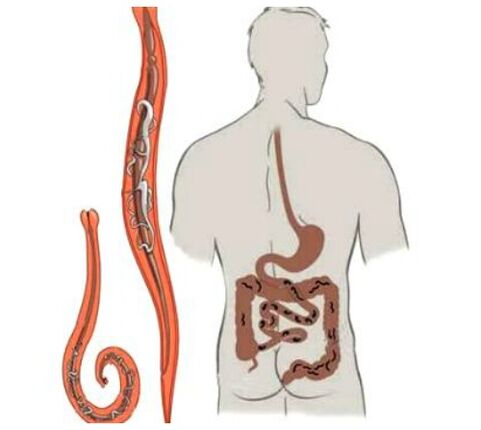The human body is an ideal environment for the habitat of pathogenic microorganisms that can affect almost any organ or system, causing a number of diseases and disorders. Such organisms are given a special place of parasites that live and feed on cells and other nutrients from the body of the "owner". According to medical indicators, about 90% of the population of different age categories are the carriers of parasites, the treatment and study of which is engaged in the section of medicine - parasitology. The term "parasites" means living organisms of different species that have the ability, precipitation in the human body, will be introduced into tissues of internal organs, ate cells, juices or absorbed foods. Foreign organisms can penetrate any part of our body and live in it for a long time or throughout the life of a person. Some types of parasites in the human body do not cause special changes, but there are those that are able to negatively affect the well -being of the "host" and cause the development of some serious illnesses. In such cases, we are talking about parasitic diseases that require immediate treatment. In medicine, parasites are called all pathogenic organisms that lead a parasitic lifestyle in the human body. These include various bacteria, viruses, fungi, as well as worms, simple, unicellular, arthropods, protozoal invasions and other species.
Parasitic diseases (invasions) are a large group of diseases that are caused by various pathogenic organisms that live and multiply inside a person. There are about 300 species of parasites that can affect the human body. Parasitic diseases can be caused by both pathogenic bacteria and parasitic protozoa, arthropods, unicellular and other parasites or viruses. The list of parasites in the human body is quite large, but regardless of the type, almost all of them secrete toxins that destroy cellular structures, damage the internal organs, penetrate the lymphatic flow, the blood that poisons the body and the work of the internal organs and systems.
In general, pathogenic organisms consume nutrients that one receives with food. Perhaps this behavior of "uninvited guests" explains that many people leading to the right lifestyle monitor their health and food do not receive the desired result, since these "gift" takes away all the best, leaving only a small part of nutrients. These creatures are so cunning that they are often concealed as other diseases and one can go around doctors for years, but does not notice a positive result in treatment.
Foreign organisms can penetrate the human body in several ways, but most often the infection is done through:
Many parasites living in the human body have no nervous, cardiovascular or respiratory system, but their reproductive organs are able to throw hundreds of thousands of ripe eggs into the environment. The eggs and larvae of parasites are very stable, they can be in the soil, water, food or personal objects for a long time. For example, the eggs of tapeworm are able to withstand minus 15 degrees and maintain their vital activity for 9 months. Almost all parasites have such protective mechanisms that cannot recognize and destroy the human body. Therefore, many parasitic diseases are difficult to diagnose. Pathogenic organisms can be both in the intestines and in the lungs, blood, liver, joints, brain and even eyes. The location of the pathogenic organisms depends on their type and other characteristics, both person and the parasite itself.
Parasites living in the body distinguish substances that help them live in a person for many years. They do not have a digestive system, but the parasites still use only useful substances that enter the human body, which allows them to live for many years until a person slowly loses his health, does not suspect the true cause.
Special organisms, to adapt to new conditions, use their "devices": pointed hooks, signs, hard hairs, fan glasses that constantly injure the mucous membranes of the organs. The parasites themselves can have a few millimeters long to several meters, they also have the ability to release various toxins that poison the body as a whole, causing not only disorders in the functioning of the internal organs, but also suppressing immunity, destroying the beneficial bacteria of the gastrointestinal tract and overloading the liver.
Parasites in the body - the symptoms of their presence may be absent or resemble clinical manifestations of other diseases. For example, larvae in the lungs cause symptoms of pneumonia, pinari - attack of appendicitis and parasites - biliary tract or pancreatitis attack.
In addition, parasitic diseases are capable of common colds, sore throat, bronchitis and other diseases. You may suspect the presence of parasites in the human body according to the following symptoms:
In addition to the above symptoms, parasitic invasions often damage the liver, kidneys and cardiovascular system, leading to a disorder in their work and the development of many diseases that are difficult to treat. It is important to note that all the above signs of parasites in the human body are not an accurate confirmation of their presence. Only professional and high quality diagnostics will help you determine the presence or absence of "uninvited guests".
It is quite difficult to diagnose the presence of helminths, especially immediately after the infection. Until recently, the only way to identify "strangers" was the duodenal sound and faeces analysis. The results of such studies allow to determine fragments, larvae or parasite eggs. However, such methods do not always produce reliable results. Currently, modern techniques are used to detect parasites that allow you to identify almost every parasite.
The results of the studies will not only determine the presence of parasites in the body, but also to evaluate the condition of the internal organs in order to identify other diseases or disorders.
Treatment of parasitic diseases depends on many factors: specific type, size, amount, age of the patient, body weight and other characteristics. A large assortment of parasite drugs has been provided on the pharmaceutical market, but not all medicines are able to overcome a particular parasite. It is important to note that almost all parasites violate the work of the internal organs, so the patient should be prescribed a complete treatment, which will be directed not only to the destruction of the invasion, but also to the repair of the damaged indoor unit.
In addition to synthetic drugs, antibiotic, against worms, antiparasitic agents that contain natural components, are used in the treatment of parasites. Such means have no contraindications and are well tolerated by the human body.
Only a doctor should treat parasitic diseases after the results of testing and the determination of the pathogenic organism. The course of treatment, doses and names of drugs are prescribed individually for each patient. All antiparasitic drugs have a large number of contraindications and side effects, so you need a doctor's consultation before their use.
Important in the treatment of parasites is the use of drugs that restore the functionality of the gastrointestinal tract, liver, kidneys, help stimulate immunity, provide the body with vitamin preparations. Not less than the main thing in the treatment of parasitic diseases is considered to be proper nutrition. Patients should exclude their diets from meat and dairy products as they are an ideal environment for the spread of parasites. It is also necessary to completely exclude the use of sugar, sweets. Nutrition should be balanced, high quality and beneficial to the body.
The prognosis after the treatment of parasitic diseases is mainly favorable, but in the case of large parasites of large size, settled in the body or significant damage to the internal organs, it is difficult to predict the result after treatment. 
You can prevent yourself from penetrating parasites, but only in the case if you follow simple rules. The prevention of parasites in a person's body lies in:
Observing simple preventive rules will allow you to prevent parasite infection, thus protecting yourself and your family from possible disorders in the work of internal organs that are so often manifested against the background of parasitic diseases.
















































